This summer, the Staley School of Leadership Studies had the honor of hosting 25 of Africa’s best and brightest young leaders for a Leadership in Civic Engagement Institute through the Mandela Washington Fellowship for Young African Leaders. The Mandela Washington Fellowship is the flagship program of the U.S. Department of State’s Young African Leaders Initiative (YALI). YALI was created in 2010 to support young African leaders as they spur growth and prosperity, strengthen democratic governance, and enhance peace and security across Sub-Saharan Africa.
Among these fellows were politicians, philanthropists, environmentalists, best-selling authors and humanitarians. They were citizens of 20 different countries, practiced various religions, spoke different languages, but all had the same infectious love to dance and passion for leadership. Four of these fellows have graciously chosen to share their stories, providing unique insight into what the Mandela Washington Fellowship looked like for them before, during and after their time at K-State.
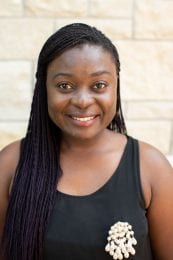
“I am a politician as well as a businesswoman” explains Linda K. Sibs. “I am working on being a voice for the unusual and uncommon voices in the constituency I reside in.” Linda lives in Zimbabwe and spends her time fighting for the rights of her fellow citizens.
When asked how the Mandela Washington Fellowship influenced the way she approached her work, Linda said, “I now practice strengths-based leadership. I have become more receptive in picking up and identifying strengths of those around me in order to be a more functional unit.”
Prior to the institute, Linda’s main motivation for pursuing the program was finding technical solutions and skills to simply make her a better candidate for public office. However, she gained so much more than that.
“Taking part in the [Mandela Washington Fellowship] gave me foundational leadership training that will develop and mold me into a much more competent member of parliament in the future.”
Linda believes she is now better equipped with the knowledge and experience to be a culturally-sensitive, understanding and successful leader in her country.
“I am so grateful and feel like the luckiest human in the world to be an alumni of the Mandela Washington Fellowship and the Staley School of Leadership Studies.”
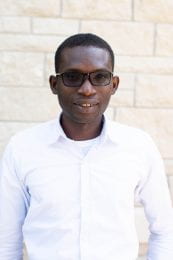
Known in the cohort by his last name, Olalekan Sipasi has helped to impact hundreds of thousands of people through his organization, ProtectOzone.
“I have taken leadership in the space of food insecurity in my home country, Nigeria, where I train children, youth, women and farmers in sustainable agricultural practices to alleviate extreme poverty.” says Sipasi. “Having been blessed with so much fertile land, natural resources and man-power, we should not have any business with extreme poverty and hidden hunger.”
Sipasi’s greatest take-away from the Mandela Washington Fellowship was the importance of active listening.
“I realized I don’t listen to people,” Sipasi explains, “ I learned during the fellowship that you don’t learn when you don’t listen to people.”
Sipasi reports that this newfound respect for active listening has greatly impacted his organization, as intelligent ideas are being nurtured that might not have been noticed if he hadn’t taken the time to listen to his employees.
As Sipasi thinks back on his time as a Mandela Washington Fellow, he is filled with gratitude.
“I just want to thank the Staley School of Leadership Studies for giving us [the opportunity] to connect with Kansas State University and the Manhattan community. This has brought a great and life-changing opportunity to me.”
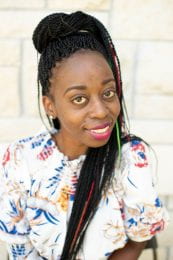
“I am a human rights lawyer who has, for the last six years, dedicated her service to one of the most vulnerable groups globally — refugees,” Hortense Khayisia Minishi explains. A proud mother of three, Hortense lives in Kenya and works at an NGO called RefugePoint.
“Refugees are skilled and have so much to contribute to their communities [if they are] given the right legal and socio-economic environment,” explains Hortense.
Before the Mandela Washington Fellowship, Hortense says she would constantly look to authority figures to exercise leadership.
“I grew up exposed to an environment where leadership was so much masked with titles or positions.” Hortense elaborates, “During the Mandela Washington Fellowship, I learned that leadership is [about] influencing others and that anyone can lead anytime, anywhere.”
Hortense believes her greatest take-away from her institute experience is that leadership is a process.
“Leadership requires us to learn, relearn and practice.”
Hortense hopes to use the skills and experiences she gained from the Mandela Washington Fellowship to influence refugee and migrant policies on a global scale.
Though there were constant stressors of being away from her home and family for so long, Hortense loved her experience at K-State.
“In it all, I was assured of one thing— that I was surrounded by people who believed in me, loved me, cared for me, were championing me on, challenging me and wishing me the very best.”
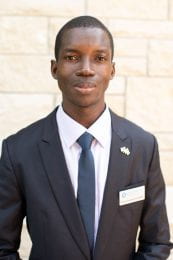
“For more than three years, I have been focusing my strengths on youth empowerment and capacity building,” says N’zoret Innocent Assoman.
Innocent lives in Cote D’Ivoire and is a country ambassador for PYAFRICA (Progressive Youths for African Empowerment and Leadership Initiative).
“I think youths who constitute the heart of the next generation need to be nurtured with proven skills and competencies.”
Innocent believes the Mandela Washington Fellowship gave him confidence and challenged him to consider issues from various perspectives, making him a better mentor and leader.
“One of my biggest take-aways from the Mandela Washington Fellowship is: If you are not practicing what you are learning then you are learning something else.”
Innocent is confident he will use what he learned in the institute to build strong relationships and a sense of community in his workplace.
Among some of Innocent’s favorite memories from the Mandela Washington Fellowship are: the opportunity to meet Governor Laura Kelly, celebrating the Fourth of July and sharing in community meals with the fellows and institute staff.
“[It would take] pages to relate my stay,” concludes Innocent. “K-State is the best institute of the fellowship because our experience was unique and great. I am KSU Wildcat forever.”
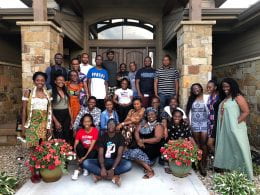
Two months post-institute and the Staley School of Leadership Studies greatly misses its 2019 cohort of Mandela Washington Fellows. The distance between us may be great, but we are enjoying being a witness to their successes from afar. Though we have all gone our separate ways, we will always be connected by this incredible experience.
On one of the final days of the 2019 institute, a fellow by the name of Babacar Diop told me, “We are one people. Do not ever believe we have borders. We are together.”
That, we are.
The Mandela Washington Fellowship for Young African Leaders is sponsored by the U.S. Department of State with funding provided by the U.S. Government and administered by IREX. Kansas State University was a sub-grantee of IREX in the summer of 2019 and implemented a U.S.-based Leadership Institute as a part of the Fellowship. For more information about the Mandela Washington Fellowship, please visit mandelawashingtonfellowship.org.
